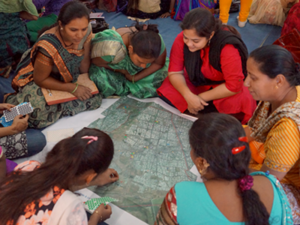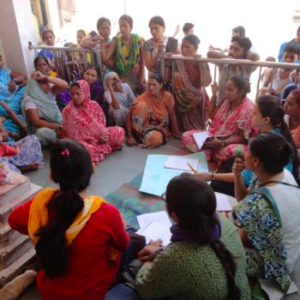Socially Just and Adaptive Community Spaces in Poor Urban Settlements in India and Colombia
 How are the livelihoods and health of the urban poor in the Global South affected when climate-induced risks intersect with unprecedented urbanisation?
How are the livelihoods and health of the urban poor in the Global South affected when climate-induced risks intersect with unprecedented urbanisation?
In short, the implications are immense and concrete collective actions are required. However, interventions at the grassroots and within formal urban planning and policy arenas, indicate that climate adaptation (and mitigation) actions target either the individual household and or the state/ city regions. While the former is insufficient to engage with externalities of livelihoods and resource access for the urban poor, the latter is often too abstract an arena for direct local action.
Hence, “Community Commons” or shared spaces within settlements constitute critical spaces to evolve resilience strategies that can attenuate socio-spatial deprivations of the urban poor. The commons are, in effect, socio-economic, ecological, cultural and political spaces that aid everyday living in the settlements. These often slip through cracks in our policy, plan and programme debates, constructs and solutions, which are structured both by the public and the private. The commons experience multiple, intersecting climate-induced risks (as against isolated risks). By extension, these spaces also embody the potential to address these intersecting risks. Thus, expanding the problem and intervention frame to include the commons, emerges as an imperative. Comprehending the myriad ways in which these spaces accommodate community living serves as a starting point to initiate these as critical elements of adaption and mitigation strategies.
As of December 2021, PlanAdapt, as part of a consortium, was successfully awarded a micro-grant from the Adaptation Research Alliance. The project proposal, which focuses on resilience in urban spaces, was submitted jointly with the following partners:
- INDÉ – Integrated Design, a research-based planning and design practice that focuses on curating sustainable human and natural habitats.
- Mahila Housing Trust, an organisation that aims to empower women in poor communities to improve their habitat.
- URBAM Centro de Estudios Urbanos Ambientales, a Medellin based research, training, and social projection centre that works on urban-environmental processes
 The primary aim of this project is to increase the resilience of disadvantaged sections of the population in such urban spaces. The means to achieve this will be through secondary research considering community commons in general, and primary research, in the form of targeted case studies of specific cities. We shall also be taking into account questions of scaling interventions up, the impact of land rights, and the potential of nature-based solutions with regard to such community-led interventions.
The primary aim of this project is to increase the resilience of disadvantaged sections of the population in such urban spaces. The means to achieve this will be through secondary research considering community commons in general, and primary research, in the form of targeted case studies of specific cities. We shall also be taking into account questions of scaling interventions up, the impact of land rights, and the potential of nature-based solutions with regard to such community-led interventions.
In this project, the role of PlanAdapt is the one of a knowledge producer and contributor. Through our extensive network, we hope to contribute towards the task by sharing our knowledge and experience from previous projects in the Global South. We envision facilitating 3 workshops over the next three months. The consortium aims to use this opportunity as a means to build a truly resilient model, one that is curated, owned and sustained by the end users – the communities – which will be premised upon and adapt to the plurality of the local context.
